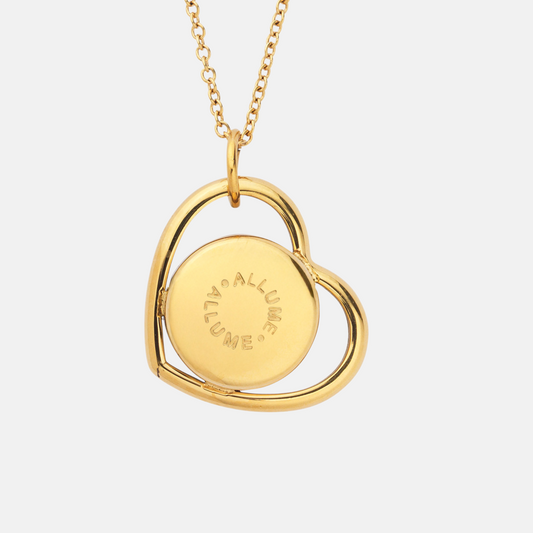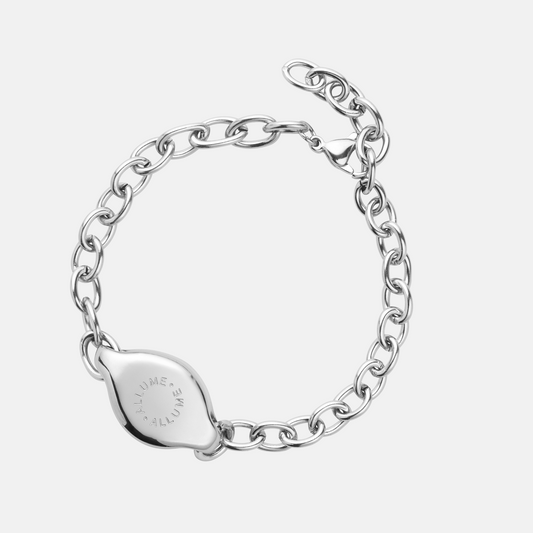By: Sarah Sinclair
Posted: 29. August 2025
Media: Femtech World
With jewellery that doubles as a discreet safety device, Danish startup all-u-me is combining social impact with innovation to address the significant impact of sexual harassment on women’s health and wellbeing.
One in three women has experienced physical or sexual violence, and around half have experienced sexual harassment since the age of 15. The misconception that these incidents always occur late at night and in dark alleyways overlooks the reality of these experiences, which for many women are a part of everyday life.
The Government Equalities Office reports that almost 72 per cent of the UK population has experienced sexual harassment at work in their lifetime. Research shows that 56 per cent of women have experienced harassment in gyms, while 60 per cent of women had been harassed while running, and 11 per cent stopped running altogether as a result.
“It’s the everyday experiences that are the problem,” Dorte Caroline Knudsen, founder of Danish startup all-u-me tells Femtech World.
“It’s not just walking down a dark street in the middle of the night, it’s the everyday, in the supermarket, on the bus, where you experience feeling unsafe or your boundaries not being respected. It’s the mental load that women are expected to carry, almost without talking about it, to get home safely. I can get home safe; I’m not the problem.”
After 14 years as Head of products at a Danish software company, at the age of 40, Knudsen felt called to channel her skills into more purposeful entrepreneurship. Inspired by the UN’s Sustainable Development Goals and anger at the global prevalence of gender-based violence, she began looking into what solutions were currently being developed to address it.
“It was sad to see that none of the solutions said anything about prevention,” she says. “All the focus was on normalising what is going on and putting the responsibility on women.”
In response, Knudsen has created a solution that aims to empower women, while also shifting “safety” from an individual to a collective responsibility.
“The beauty of feeling free”
all.u.me has designed a range of jewellery featuring delicate gold and silver chains and ocean-inspired charms, which double up as an alarm system to enable them to call for help when they feel unsafe.
“Tech is wonderful, but it can do more when it’s put into something beautiful, which is very rarely seen in the tech space,” says Knusden.
“Most of the existing solutions were one-size-fits-all, but women don’t work like that. We want to wear something that makes us feel beautiful.”
As well as being beautiful to look at, the jewellery is practical. Fully waterproof and with a battery life lasting up to four years, it is designed to be worn all the time, making it “probably the first real wearable”, according to Knudsen.
Each item has a discreet button, linked via Bluetooth and GPS to an app connecting the wearer to nearby bystanders. This may be friends or family who have downloaded the app to their phone specifically for this purpose, or other all.u.me users in the local area.
If a woman finds herself in an uncomfortable or unsafe situation, three firm pushes of the button notify up to 20 nearby bystanders or ‘backups’ with her location, alerting them to the incident so that they can intervene.
The app trains all users in the 5D bystander intervention method – distract, delegate, delay, direct, document – in as little as three minutes, so they can choose the approach that feels right at the time.
This is designed to break down some of the barriers that may prevent people from stepping in, such as not noticing, not being sure whether help is wanted, or not knowing what to do, Knudsen explains.
“The feedback we get from the workshops we do is that people like to have a framework. Empowering bystanders, by telling them ‘this is what you need to do’, and ‘this is when you need to do it’, makes people a little bit more inclined to help,” she says.

“It’s no more genius than the technology that already exists, and there are times when it might not work, but that’s why the feeling of security is so important, because that’s the everyday benefit of this.”
According to all.u.me’s focus groups, 98.8 per cent of people being trained in these methods feel there’s at least one thing they can do the next time they witness harassment, while 76 per cent who saw harassment after attending the training reported that they intervened.
“The jewellery is just one element,” Knudsen continues.
“It’s actually much more about the feeling of safety and belonging to a community that I hear our users appreciate every day, and the dialogue around it. Maybe it’s telling your loved ones why you want this jewellery, or maybe it’s somebody on the bus, or the bus driver, the bartender, or the guy at the fitness center who has the app. It’s not a guarantee, but that’s where the social responsibility kicks in, and of course, our most important job is to make sure that people have the app.”
Reframing femtech
Safety and sexual harassment can be overlooked in the femtech sector. Both the World Health Organization and the US Centers for Disease Control classify sexual violence as a major public-health issue, and evidence shows that these experiences can not only have a significant impact on mental health but can also lead to physical symptoms and an increased risk of developing chronic conditions, contributing to long-term health disparities.
One recent study found that women who had experienced being stalked and/or obtained a restraining order had a 41 per cent and 70 per cent higher risk of developing cardiovascular disease, respectively. Other research has shown that women with a history of violence are around twice as likely to develop chronic pain conditons and are over-represented among women with conditions such as chronic pelvic pain, IBS, and migraine.
In many ways, all.u.me expands the understanding of femtech, centering safety as a foundation for health and equality. But Knusden is wary of being labelled as a ‘femtech’ company.
“The fact that safety is not seen as femtech is quite weird, actually, when statistically so many of us will experience harassment,” she says.
“But I also want to acknowledge that there are so many people who can benefit from this. It’s not just about gender equality, it’s for anybody who may feel unsafe in society.”
Not a jewellery brand, but a tech enabler
The more people who have the app, the more effective the tool is. While women can create their own networks from anywhere by asking friends and family to download the app, it works most effectively in more populated urban areas where more users are likely to be within a 1 km range.
Since launching in June, all.u.me now has 2,000 active users in Copenhagen. There are plans to expand into Sweden, Germany, and the UK, but partnerships with existing jewellery brands – to integrate its safety devices into their existing designs – will be crucial for helping this technology reach more women.
“There are so many jewelry brands in the world, I don’t want to be another one,” says Knudsen.
“We want to be a technology enabler. Our vision is to empower and inspire everyone – people, brands, organisations – to stand against harassment, whether they do it by downloading the app, or partnering with us to make the jewellery. This is how we will scale through these partnerships.”
She has big ambitions, believing all.u.me could be the “first social impact unicorn”, combining scalable tech, commercial sustainability, and philanthropy.
“I have global ambitions with this, but I also have philanthropical ambitions, in the sense that I believe that every young girl and woman should be able to feel safe and be who they are, Knudsen adds.
Sharing her experience of using all.u.me, one woman described her sense of safety as going from a “two to a four out of five”.
“Her feeling of safety doubled,” Knudsen emphasises. “It’s not a 100 per cent guarantee, but it meant that she stopped carrying her keys between her fingers. If we can make people feel safer, and if we can make it easier for bystanders to act, then we can change the world.”





